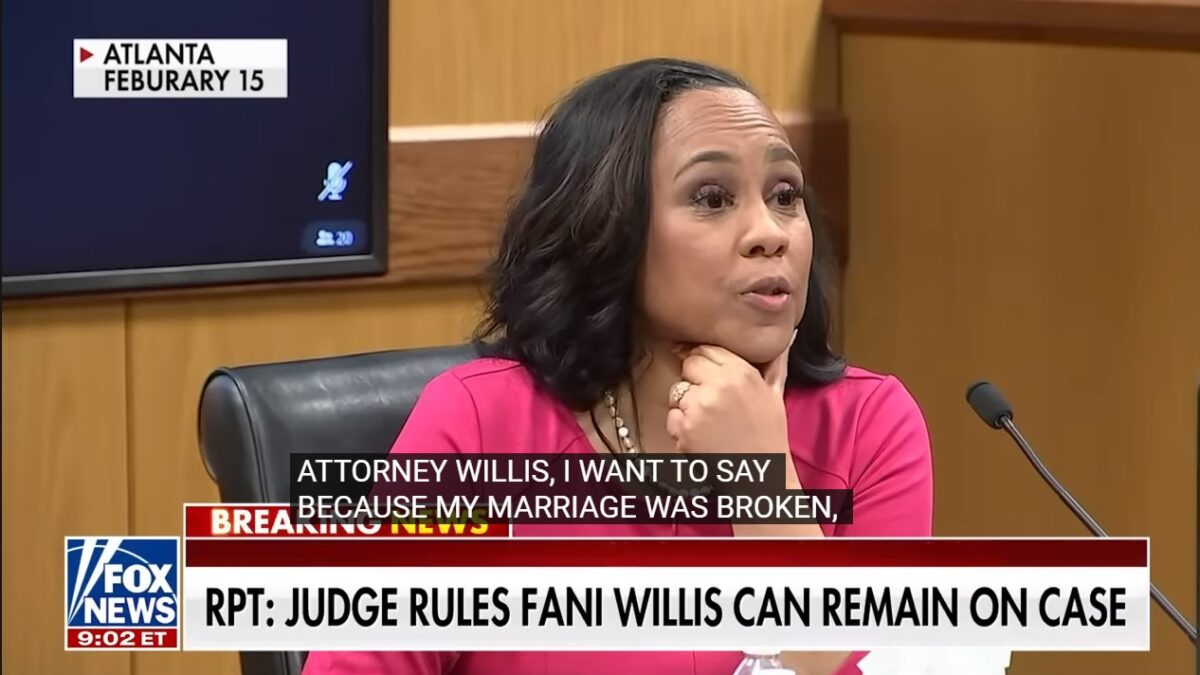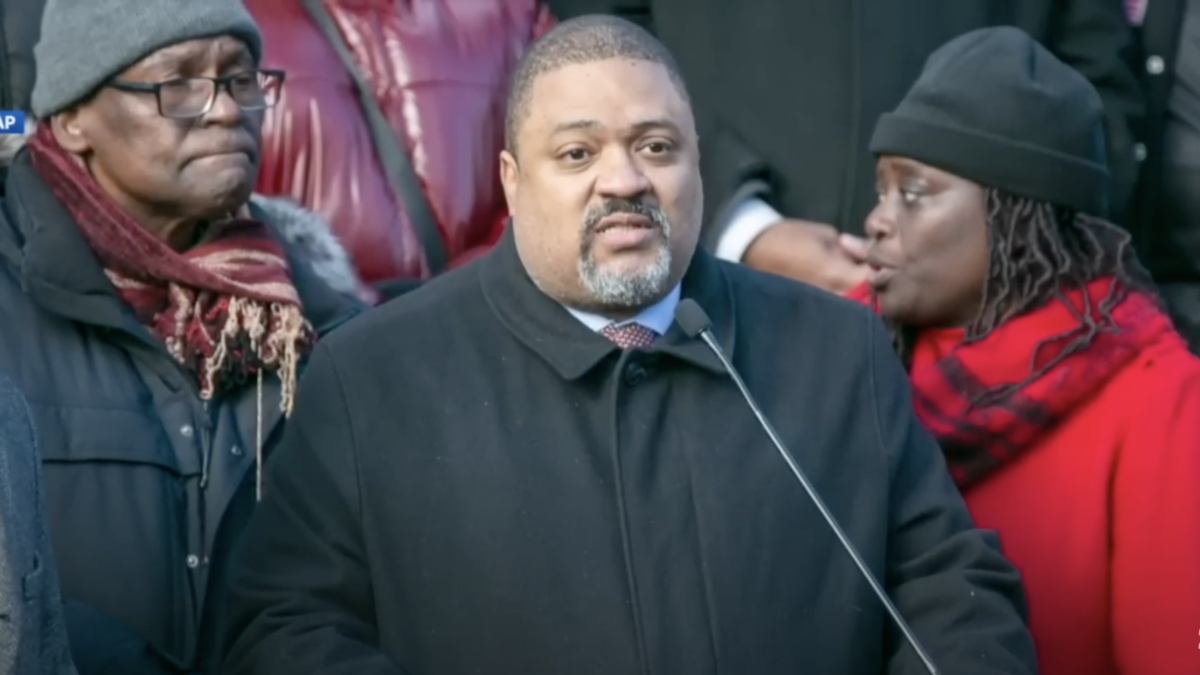Fani Willis and the Fulton County district attorney’s office can remain in charge of the prosecution of Donald Trump and his Republican co-defendants so long as Willis’s former lover resigns, presiding Judge Scott McAfee ruled Friday.
Within hours of the decision, Nathan Wade—now Willis’s ex—exited the case. While McAfee declared that half-measure solved the problem of an “appearance of impropriety,” the court’s reasoning established that true justice requires the removal of Willis and the entire Fulton County D.A.’s office.
Judge McAfee’s 23-page opinion followed a two-month spectacle that began when defendant Michael Roman filed a motion to dismiss the charges brought against him by Willis and to have the Fulton County D.A.’s office disqualified from prosecuting the case. Willis had charged Roman, a Trump 2020 campaign official, along with former President Donald Trump and 17 other defendants in a sprawling 98-page indictment that included some 41 different counts.
While Roman’s motion sought dismissal of the charges, the thrust of the court filing concerned the propriety of the Fulton County D.A.’s office prosecuting the case. It cited evidence that Willis had benefitted financially from the prosecution by hiring her then-lover, Wade, to serve as a special assistant district attorney on the case and then taking expensive vacations with him. Roman, joined by a handful of co-defendants, argued reaping these financial benefits constituted a conflict of interest that under Georgia law required disqualifying Fulton County D.A.’s office from the case.
In Friday’s opinion, Judge McAfee concluded “the Defendants failed to meet their burden of proving that the District Attorney acquired an actual conflict of interest in this case through her personal relationship and recurring travels with her lead prosecutor.”
Initially, the Fulton County judge acknowledged that proof of “financial enrichment and improper motivations” can create a conflict of interest requiring a prosecutor disqualification. McAfee concluded, however, that the evidence was insufficient to show any financial gain from her relationship with Wade “was a motivating factor on the part of the District Attorney to indict and prosecute this case.”
Here, McAfee cited Willis’s financial position—she earned more than $200,000 per year—and evidence that Willis and Wade “roughly divided evenly” travel expenses, as negating the premise that Willis benefitted personally from the criminal case against Trump and his allies. The court also noted that Willis’s efforts to quickly prosecute the case countered any argument that the financial benefit to Wade influenced the D.A.’s handling of the case. “[T]here is no indication the District Attorney is interested in delaying anything,” the court reasoned.
There are two fundamental flaws with this reasoning. First, McAfee ignored that Willis could benefit personally without benefiting financially by bestowing her beau with a cushy county contract, whether it gave Willis a sense of control in the relationship, helped her curry favor with Wade, or merely provided Willis a chance to spend more time with her lover.
Second, it isn’t only “delay” that would benefit Wade financially (and Willis personally), as an increase in work on a shorter timeframe also added to Wade’s compensation. On this latter point, Judge McAfee missed two key facts that support a make-work theory.
First, when Willis first hired Wade on Nov. 1, 2021, to serve as a special assistant D.A., the contract provided that “Wade was not to perform more than 60 hours of work per month without written permission.” Then, in October 2022, Wade and Willis took what, from the evidence, appears to be their first extended vacation together. They traveled to Miami and then to Aruba on a cruise.
The following month, on November 15, 2022, Willis renewed Wade’s contract, but apparently removed the 60-hour per month maximum. This change shows Wade could benefit even without the D.A. prolonging the case.
The breadth of the nearly 100-page indictment and that it included multiple counts a judge has already ruled were legally deficient also supports a claim that Willis allowed Wade to churn the case to bill more hours.
However, it wasn’t Judge McAfee’s failure to find an actual conflict of interest that proved most troubling about Friday’s decision. Rather, it was that McAfee found the relationship between Wade and Willis created an appearance of impropriety that necessitated Wade’s removal from the case—but not Willis. His reasoning was inconceivable!
Allowing Wade to remain on the case could cause “reasonable members of the public” to “be left to wonder whether the financial exchanges have continued resulting in some form of benefit to the District Attorney, or even whether the romantic relationship resumed,” Judge McAfee explained. After all, “the District Attorney testified her relationship with Wade has only ‘cemented’ after these motions [to disqualify her] and “is stronger than ever.”
“[A]n outsider could reasonably think that the District Attorney is not exercising her independent professional judgment totally free of any compromising influence,” the Fulton County Superior Court judge thus concluded. One would think coitus might have cemented their relationship more strongly than some court filings.
In any event, if an outsider could reasonably believe Willis was “not exercising her independent professional judgment totally free of any compromising influence” because she kept her ex-lover on the payroll, a member of the public could also reasonably believe Willis was not exercising her independent judgment when she and Wade were lovers. Likewise, if the removal of Wade was necessitated because reasonable members of the public might wonder if the affair and financial exchanges had resumed, removal of both would be required because the public knows such exchanges occurred during their affair, and it takes two to tango.
Further, for the court to find Willis could remain, but not Wade, after concluding “an odor of mendacity remains” was nonsensical, because Judge McAfee found there were “reasonable questions about whether the District Attorney and her hand-selected lead SADA testified untruthfully about the timing of their relationship” (emphasis added).
If the presiding judge found it reasonable to question whether the D.A. lied on the stand and under oath, so too would it be reasonable for the public to question whether Willis committed perjury. Allowing her to continue with the prosecution under these circumstances is beyond the pale.
But there is an even more profound reason for Willis and the entire Fulton County D.A.’s office to be disqualified: Willis and the Fulton County D.A.’s office now have a personal stake in prosecuting the defendants who exposed Willis’s affair with Wade, showed them both to be possible perjurers, and embarrassed both Willis and her team of prosecutors.
As Judge McAfee opened his Friday opinion, “Importantly, prosecutors are expected to assume a role beyond a mere advocate for one side and must make decisions in the public’s interest – not their own personal or political interest.” “Recognizing these are not empty slogans nor toothless admonitions without practical effect, Georgia courts have not hesitated to step in and use their inherent authority to disqualify a state prosecutor when required,” McAfee continued.
Anyone who watched Willis testify during McAfee’s evidentiary hearing knows full well that D.A.’s focus will not be on the public interest, but on obtaining retribution for what she saw as the defendants putting her on trial. Willis’s colleagues in the D.A.’s office went to great lengths to assist Willis and Wade in fighting the accusations, leaving them only slightly less tainted.
Judge McAfee may have thought half-measures could suffice, but his reasoning compels the disqualification of Willis and the Fulton County D.A.’s office.








